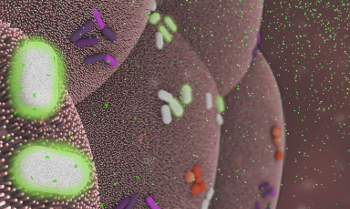
Science
 YOUR GUT AND MICROBES
YOUR GUT AND MICROBES
 The wildlife in our digestive tract influences our moods far more than we ever imagined.
The wildlife in our digestive tract influences our moods far more than we ever imagined.
by John McManamy

by John McManamy
IS THERE any truth to having a gut feeling?
According to the nineteenth-century humorist, Josh Billings: “I have finally come to the conclusion that a good reliable set of bowels is worth more to a man than any quantity of brains.”
Twenty-first century medicine is validating Billings. Chronic low-grade inflammation is associated with no end of psychiatric disorders, and one pathway is the gut-brain axis (via various neural, endocrine, and immune system connections). In effect, as David Scheiderer, who practices integrative psychiatry in Florida, explained to his audience at the 2015 Psychiatric and Mental Health Congress held in San Diego, we are looking upstream for the “cause of the cause of the cause.”
We know, for instance, that stress and our environment activate fight-or-flight, which is linked to the HPA axis that releases adrenaline and cortisol into the bloodstream. We also know that those exposed to stress in childhood are more likely to suffer from chronic inflammation as adults.
So what is going on in the gut? Via two different pathways, epithelial cells in the lining of your gut transport molecules to adjoining cells. Those with “leaky guts,” however, experience a loosening of these cells. Gaps open up, allowing foreign matter such as toxic metabolites to enter the system and find their way to the brain.
This may result in decreases in serotonin and dopamine and other neurotransmitters. Recent studies have shown links between gut microbes and behavioral changes in lab animals. In a 2011 study, for instance, researchers altered the gut microbe population in a strain of timid mice. The change turned them more bold and adventurous, and increased BDNF (a protein involved in cell maintenance) levels in the brain’s hippocampus.
This particular study came up at an Exponential Medicine conference I attended in San Diego the year before. There, a number of presenters talked about the microbiome. This is a reference to the largely unaccounted for 100 trillion microorganisms housed inside your body, totaling 90 percent of your cells and 99 percent of your genes.
You read that right. Not much of "us" is present and accounted for. Basically we are a walking colony of microbes. As Larry Smarr, Director of the California Institute of Telecommunications and Information Technology, told his audience, we need to “map out the totally unknown biological space inside us.”
The NIH is on the case with its Human Microbiome Project, launched in 2008. The money question, from our point of view, was framed by Thomas Insel, then head of the NIMH. In a 2010 blog post, he asked:
Do infectious agents influence the development of autism, anxiety, or mood disorders?
He went on to say that this is a “frontier area” for NIMH research, and that microbiomics may prove important in understanding and treating mental disorders.
What we already know is that the human gut hosts its own independent nervous system, and that this “second brain” communicates with our “other” brain via the vagus nerve. Significantly, we are born with sterile guts. It could be that our brain circuitry is influenced by the microbial populations we pick up along the way.
SIGN UP FOR MY FREE EMAIL NEWSLETTER
This suggests a whole new area of diagnosis and treatment based on manipulating the wildlife inside our digestive tract, but for this to happen we need to know a lot more. Dr Smarr made reference to “big data,” a theme taken up by Jessica Richman, CEO at uBiome. Currently, medical research is based on small sample sizes, typically 200 to 300 subjects. But “crowdsourcing” principles can exponentially increase those numbers and enable us to spot patterns and isolate culprit microbes.
Already, says Ms Richman, personal microbiome tests are available for $87. The potential exists for individual readings to feed into big data readings, which in turn may translate into precise and individual treatments.
In the meantime, there is talk of probiotics to improve the fauna in your gut and intestines. This may involve eating more Greek yogurt or other priobiotic foods or taking supplements or reducing stress. Not exactly precise and individual, but who knows? More individualized treatments may include introducing new microbial strains into the digestive tract.
One thing, though, we know for certain: It is certainly much easier to tinker with our gut than it is our brain. Imagine, if we can produce profound changes with minimally invasive procedures. Just imagine. Some people already are.
Based on a series of blogs, Feb, 2011, republished as two articles, April 13, 2011, reworked into one article, Jan 12, 2017.
NEW!
Follow me on the road. Check out my New Heart, New Start blog.












